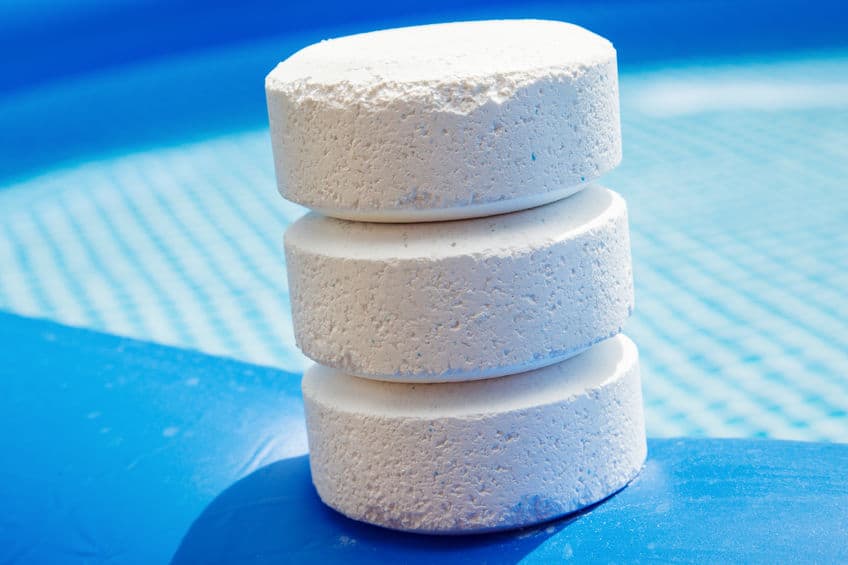What Is Shocking A Pool?
From a pool perspective, shock is both a verb and a noun:
Shocking a pool: Refers to quickly raising the chlorine level in your pool – including a salt water pool – when water chemistry (free chlorine specifically) gets low.
Pool Shock: An actual product typically in crystal form called Shock that does exactly that: It shocks the pool and gets chlorine levels up to the proper level quickly. It’s a highly concentrated chlorine product.
Shocking a pool involves adding the product in one of several ways depending on product instructions. If it’s in powder form, it’ll probably be recommended that you get a large bucket and fill it with an amount of water, add the shock powder and stir it to mix it up. You then pour the full bucket into the pool either directly into the skimmer with the pump running or directly into the deep end of the pool to circulate.
So yes, you can and sometimes need to shock a saltwater pool to help quickly get the chlorine level back up to the required target when the chlorinator cell isn’t capable of quickly doing it on its own.
How Do You Shock A Saltwater Pool?

You shock a saltwater pool the same way you would shock a chlorine one: As described above, you use a liquid or crystal chlorine shock product and add it directly to the pool as required and as per instructions.
While a saltwater pool chlorinator is capable of producing enough chlorine to keep a pool sanitized, the truth is that it can’t produce as much chlorine as is often required to quickly bump chlorine levels up as needed. Certainly not as well as a shock product whose sole purpose is to quickly raise chlorine levels.
Typically a saltwater pool chlorinator is required to keep the salt level in your pool between 2700-3400 ppm (parts per million) which will ensure the water is sanitized and clean for swimming.
Depending on what product you use (brand), the form (liquid, crystal) and the amount of shock you need to add, the instructions for adding shock to your pool will differ.
Do You Have To Shock A Saltwater Pool?

Sometimes, yes you may need to shock a saltwater pool. Common times include:
- Opening your pool in the spring when there is no chlorine available and you need to shock the system to start creating chlorine from the salt generator by using chemical chlorine. It’s kind of like using kindling wood to start a fire or lighter fluid to get a BBQ running.
- When closing your pool to prevent algae from growing after you shut the system down for winter and no chlorine is being produced.
- After periods of heavy rain which can mess with pool chemistry.
- After heavy pool usage which brings significant pollutants into the water.
- During very sunny hot days when UV rays kill chlorine.
The best time to shock or super chlorinate your saltwater pool is in the evening when the sun has gone down and you’re done using the pool for the day. This way, the direct sun’s UV rays can’t destroy the chlorine before it has a chance to work and the pump can run and circulate the chlorine overnight so the pool is ready to use the next day.
NOTE: Despite what you may have read, a heavy algae outbreak is not the time to shock or super chlorinate in order to get rid of it. If you have an algae outbreak, you need to measure water chemistry and fix it (chlorine is probably low) and use an algaecide to kill the algae. Chlorine on its own won’t do that. Link this link to learn about How To Kill Green Algae.
Conclusion
- Can you shock a saltwater pool and are there cases when you should? Yes, there are multiple times when you need to.
- Opening and closing a pool, periods of heavy rain or sun and heavy pool usage are all times when shocking a saltwater pool may be necessary.
- Shocking a pool involves adding large amounts of chlorine into the pool to quickly raise chlorine levels to restore proper chemistry.
- Follow all instructions when adding chlorine to the pool as large amounts of chlorine put directly into the system through the pump can damage the salt water cell.

